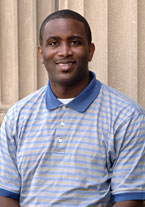Inside Iowa State
Inside ArchivesSubmit newsSend news for Inside to inside@iastate.edu, or call (515) 294-7065. See publication dates, deadlines. About InsideInside Iowa State, a newspaper for faculty and staff, is published by the Office of University Relations. |
Aug. 12, 2005 Promoting careers in agricultureby Barbara McBreen, Ag Communications The south side of Chicago isn't the first place you think about when the topic is agriculture. Levon Esters is trying to change that. "Students are surprised that someone from Chicago is involved in agriculture," said Esters, an assistant professor in agricultural education and studies. "I'm an African American, I'm from Chicago's south side and I didn't have agricultural classes in high school, so you can't get anyone more nontraditional than myself," Esters said. "I try to make a personal connection with students by telling my story. That's important because more of our students are coming from nontraditional backgrounds." Although Esters grew up in Chicago, he did work at his father's small hobby-farm during the summers. At the time, he thought agriculture was limited to what happened on the farm. Later, he saw the same stereotype in a book he was reading to his 3-year-old daughter. "It promoted the same stereotypes about agriculture I learned as a child," Esters said. That image changed for Esters while attending Florida A&M University. After a friend told him about the opportunities in agriculture, he decided to major in agricultural business, a decision that redirected his future. "When I went back to Chicago, there was an opening for an ag business teacher at the Chicago High School for Agricultural Sciences," Levon said. "I taught there for two years and decided to pursue master's and doctorate degrees in agricultural education. He received his master's degree from North Carolina A&T State University and his doctorate degree from Penn State. His vision now is to establish a pre-college summer institute focused on the agricultural sciences. The institute would introduce students to the educational and career opportunities in agriculture. It's an idea based on his experience at Penn State, where he coordinated a similar program. Agriculture: it's not just farmingEsters also participates in the College of Agriculture's visiting professor program. The program gives him a chance to visit students in Iowa's high schools and elementary classrooms. "Essentially, students want to know if they can pursue successful careers," Esters said. "There are more than 300 careers students can pursue in the agricultural sciences and that's the message they need to hear." Esters started teaching at Iowa State University in 2004. His research is focused on identifying factors that influence the career choices of students enrolled in secondary and postsecondary agriculture programs. Robert Martin, chair of the agricultural education and studies department, said Esters' research is cutting-edge. "There aren't many people doing what he's doing," Martin said. "It's fascinating and it will help us understand how people make decisions about careers." Interest in agricultural careers is blossoming, Martin said. Since 1990, student enrollment in high school agricultural education programs has increased from 9,000 to 17,000 statewide. "High school curricula has changed to reflect the careers in agriculture, which include horticulture, biotechnology, nutrition, natural resources and numerous other options," he said. Mental roadblockChanging people's perception about agriculture is a challenge. Martin said people seem to think that because there are fewer farmers, there are fewer opportunities in agriculture. "It's exactly the opposite in agriculture because students can focus on careers in nutrition, microbiology, communications, teaching, turf management -- the list is endless," Martin said. Mike Gaul, director of career placement in the College of Agriculture, agrees. The five-year outlook for agricultural graduates indicates that there are more jobs than graduates to fill them. According to a U.S. Department of Agriculture report, there will be 52,000 job openings related to agriculture, food and the natural sciences every year for the next five years. The report indicates an annual shortage of 2,700 graduates. Gaul said that 98 percent of the students in the College of Agriculture have jobs or are pursuing graduate degrees within six months of graduation. "Our students are really sought-after and most have jobs before they have diplomas," Gaul said. Service to studentsAlong with his research, Esters teaches and advises students. In June, he was recognized for his work with students, receiving the Teaching Award of Merit from the North American Colleges and Teachers in Agriculture organization. The award recognizes outstanding teaching and service to students. "I enjoy what I do," Esters said. "And that's what I want students to see." |

Levon Esters Quote"Essentially, students want to know if they can pursue successful careers. There are more than 300 careers students can pursue in the agricultural sciences and that's the message they need to hear." --Levon Esters |